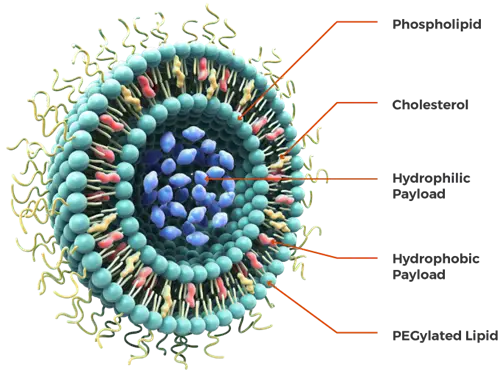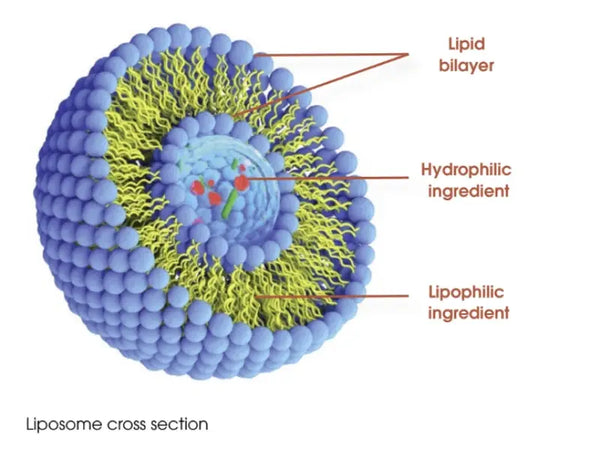Этот всесторонний обзор углубляется в революционное применение липосомов в индустрии пищевых добавок, сосредоточив внимание на их исключительной роли в доставке необходимых питательных веществ в клетки организма. В статье исследуется, как липосомы (небольшие, сферические и очень сложные везикулы, содержащие один или несколько концентрических липидных бислоев), стали технологией краеугольного камня, которая существенно усиливает биодоступность питательных веществ, инкапсулированных в добавки. Выступая в качестве защитных носителей, липосомы гарантируют, что питательные вещества экранируются из суровых условий в желудочно -кишечном тракте, тем самым сохраняя свою структурную целостность и функциональную активность, пока они не достигнут своих целевых участков в организме.
Липосомы являются фундаментальными для эффективного направления питательных веществ на определенные клетки или ткани, где они больше всего нужны. Этот целевой подход не только максимизирует терапевтическую эффективность пищевых добавок, но и сводит к минимуму риск потенциальных побочных эффектов, поскольку он снижает необходимость высоких доз, в то же время достигая оптимальных физиологических преимуществ.(1)

Изображение: Липосомная структура.
История липосом
Впервые обнаруженные в 1961 году британским гематологом Алеком Бангэмом, липосомы развивались в качестве важнейших автомобилей родов. Примечательные их биосовместимостью и способностью инкапсулировать как любящие воды, так и любящие жировые агенты, липосомы способствуют эффективной доставке питательных веществ при минимизации рисков, связанных с токсичностью.(2)
Развитие липосом подвергалось значительным усовершенствованиям с 1970 -х годов. Ранние версии липосомов, наряду с такими вариациями, как мицеллы и наноэмульсии, были основополагающими при создании современных систем доставки, особенно с появлением синтетических поверхностно-активных веществ и методов обработки с высоким сдвигом. Эти инновации уменьшили размер частиц, повышая стабильность, срок годности и ясность полученных продуктов.(3)
Понимание липосомальной структуры
Липосомы образуются из амфифильных фосфолипидов. При рассеивании в воде эти фосфолипиды сами входят в бислои, создавая гидрофобный внутренний интерьер и гидрофильную внешность. Эта универсальная структура позволяет липосом эффективно инкапсулировать широкий спектр питательных веществ.(4)
В водной среде фосфолипиды спонтанно образуют бислои с их гидрофильными «головами», обращенными к воде и гидрофобным «хвостам», ориентированными. Затем бислои закрываются в пузырьки, инкапсулируя водный раствор внутри.(5)

Полезные роли липосом включают следующее: (6)
- Улучшение доставки питательных веществ: Липосомы играют важную роль в доставке питательных веществ из -за их защитного механизма, повышенной биодоступности и потенциала для целевой доставки.
- Защитная роль: Липидный бислой липосомов щитов инкапсулировал питательные вещества от внешних факторов, защищая чувствительные соединения от деградации в пищеварительном тракте и увеличивая их стабильность.
- Увеличение биодоступности: Облегчая поглощение инкапсулированных соединений в организме, липосомы усиливают биодоступность питательных веществ, гарантируя, что более значительная доля активных ингредиентов достигает системной циркуляции.
- Целевая доставка: Благодаря модификациям поверхности липосомы могут быть спроектированы для нацеливания на определенные клетки или ткани, гарантируя, что инкапсулированные питательные вещества доставляются в желаемое место в организме.
Преимущества липосом в пищевых добавках включают, например: (7-9)
- Усиленное поглощение: Липосомные добавки демонстрируют превосходные показатели поглощения по сравнению с традиционными составами добавок, максимизируя эффективность инкапсулированных питательных веществ.
- Дозировка эффективности: При увеличении биодоступности потребителям требуются более низкие дозы липосомных добавок для достижения тех же или даже усиленных терапевтических эффектов.
- Длительная стабильность: Липосомы расширяют срок годности добавок, предоставляя стабильную среду для инкапсулированных питательных веществ, защищая их от окисления и деградации.
- Универсальность в инкапсуляции: От витаминов и минералов до антиоксидантов и травяных экстрактов, липосомы могут инкапсулировать различные питательные вещества, что делает их очень универсальными.
- Доставка витамина: Липосомы особенно полезны для доставки витаминов, усиливая поглощение как растворимых в воде, так и жирорастворимых витаминов.
- Антиоксидантная защита и доставка: Чувствительные антиоксиданты часто разлагаются во время пищеварения; Липосомы защищают эти молекулы, гарантируя, что они держат целевые клетки нетронутыми.
- Травяная и ботаническая доставка экстракта: Многие травяные и ботанические экстракты имеют низкую биодоступность при употреблении в традиционных форматах. Липосомальная инкапсуляция значительно усиливает поглощение этих полезных соединений.
Потенциальные недостатки липосомной доставки:
- Высокая текущая стоимость
- Возможность плохого производства (например, высокий размер частиц, плохие ингредиенты).
- Возможность нестабильности
- Увеличение внутриклеточной доставки
Заключение
Включение липосомальной технологии в сектор пищевых добавок знаменует собой значительный шаг вперед в улучшении доставки питательных веществ. Благодаря своей уникальной структуре и свойствам липосомы обеспечивают защиту, повышенную биодоступность и точную доставку инкапсулированных питательных веществ. Благодаря продолжающимся исследованиям и разработкам применение липосом в пищевых добавках будет расширяться, обещая более эффективные и инновационные продукты, способствующие здоровью, для потребителей.
Ссылки:
- Келлер, Б. С. (2001). Липосомы в питании. Тенденции в области пищевых наук и техники, 12(1), 25-31.
- Shade, C. W. (2016). Липосомы как передовые системы доставки для нутрицевтических препаратов. Интегративная медицина: журнал клинициста, 15(1), 33–36.
- Koynova, R. & Tenchov, B. (2015). Недавний прогресс в производстве липосом, актуальности к доставке лекарств и наномедицине. Недавние патенты на нанотехнологии, 9(2), 86-93.
- Paternostre, M., Ollivon, M. & Bolard, J. (1996). Липосомы: приготовление и мембранное белок реконструкция. В Руководство по мембранным липидам (стр. 202-247). Берлин, Гейдельберг: Спрингер Берлин Гейдельберг.
- Рудольф, А.С., Ратна Б. Р. и Кан Б. (1991). Самосборные фосфолипидные нити. Природа, 352(6330), 52-55.
- Shade, C. W. (2016). Липосомы как передовые системы доставки для нутрицевтических препаратов. Интегративная медицина: журнал клинициста, 15(1), 33–36.
- Келлер, Б. С. (2001). Липосомы в питании. Тенденции в области пищевых наук и техники, 12(1), 25-31.
- Jahadi, M., Keighobadi, K., Azimzadeh, B., Keivani, H., & Khosravi-Darani, K. (2021). Липосомы как растительные носители соединения: обновленный обзор. Текущее питание и наука о пищевых продуктах, 17(8), 790-797.
- Subramani, T. & Ganapathyswamy, H. (2020). Обзор методов липосомальной нанокапсуляции и ее применения в пищевой и нутрицевтической среде. Журнал пищевой науки и техники, 57(10), 3545-3555.





